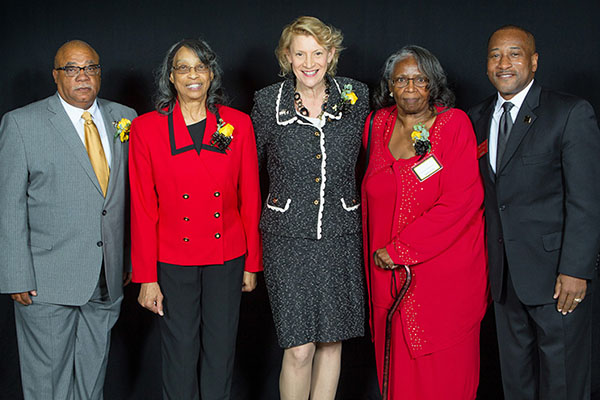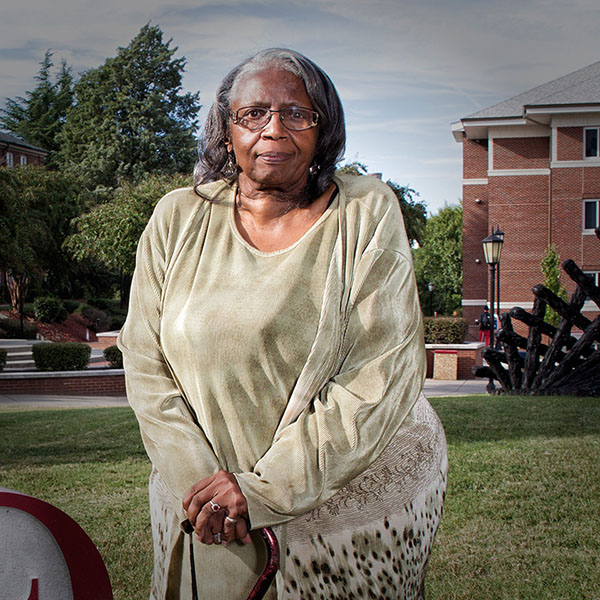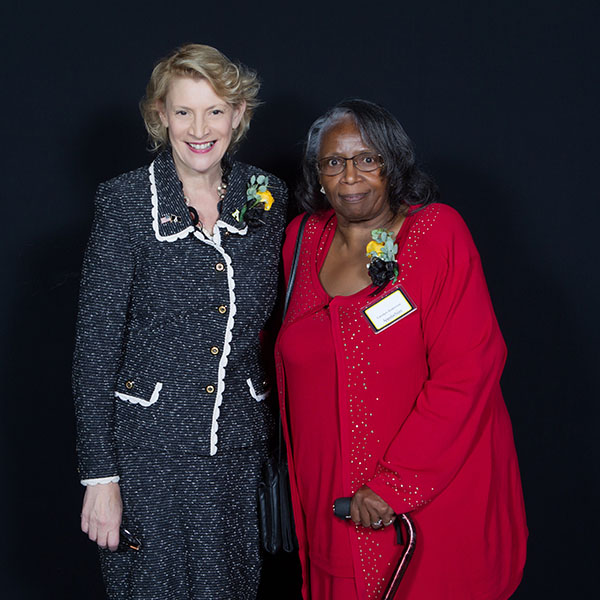Alumna Dr. Carolyn Anderson ’69 of Winston-Salem is one of four recipients of Appalachian State University’s Faces of Courage Award. Having earned a degree in mathematics from Appalachian, Anderson became the university’s first African-American, full-time faculty member. She taught in the Department of Mathematics.
The Faces of Courage Award recognizes those who were instrumental in Appalachian State University’s early diversity efforts.
This video tribute played at the Commemoration of Integration, held Oct. 2 in the Holmes Convocation Center as part of 2015 homecoming weekend activities. Also receiving Faces of Courage Awards at this event were Dr. Willie Fleming ’80 ’84 of Charlotte, Barbara Reeves Hart ’65 of Gastonia and Dr. Zaphon R. Wilson ’76 ’77 of Raleigh.
The award recognizes those who were instrumental in Appalachian State University’s early diversity efforts. Another former student received an honorary degree and the Black and Gold Medallion.
Anderson held faculty or administrative posts at Livingstone College and Rowan-Cabarrus Community College before retiring as associate director of the Center for Excellence in Teaching and Learning at Winston-Salem State University.
In the video, Anderson shares how she came to Appalachian and the benefits of a well-rounded liberal education. She also says, “My biggest hope would be that in 10 years Appalachian would look totally different than what it does now, with more students involved in research and that there would be a larger diverse population.” She also encourages students to engage in community service.
About Appalachian State University
As a premier public institution, Appalachian State University prepares students to lead purposeful lives. App State is one of 17 campuses in the University of North Carolina System, with a national reputation for innovative teaching and opening access to a high-quality, cost-effective education. The university enrolls more than 21,000 students, has a low student-to-faculty ratio and offers more than 150 undergraduate and 80 graduate majors at its Boone and Hickory campuses and through App State Online. Learn more at https://www.appstate.edu.
Transcript
Dr. Carolyn Anderson: How I got to Appalachian? I got there because of an ad I saw for graduate school and Dr. Robert Walker, he heard about Livingstone because it was HBCU that was in Salisbury, North Carolina, and he needed to find a student of color for his grant. It was a special grant to train teachers to teach culturally disadvantaged students. He came down to Livingstone the day after graduation because he hadn’t received my application. He walked around campus while I filled out another application and then went back to Boone and accepted me in his program. Three years, I was there for three years. I did two years of grad school and then I taught there a year.
I think the advice I’d give Appalachian students is the same I give all our students: make the most of what you’ve got. I went to Appalachian for two years. I got my master’s degree, but I learned a lot that I wasn’t tested on. We are here to learn how to learn and that once you learn how to learn you can learn almost anything. I started out in mathematics ended up teaching computer programing and then ended up doing staff development. That wasn’t what I went to school for, so having a well-rounded liberal education helps you to explain your specialty area more so than having a narrow focus on one thing. My biggest hope would be that in 10 years Appalachian would look totally different than what it does now and that more students would be involved in doing research and that there would be a larger diverse population. Community service is important all the time, but it is really important while you’re in college. I don’t think people understand that it’s your privilege to be able to go to college, not everyone can go to college. While you’re there you owe something back to the community that sent you and the community that you happen to be learning in. I think public service is one of the ways you can give back to those communities. It doesn’t have to be a lot of time, but giving back some time, and it doesn’t always have to be money that’s involved in it. Your time is more precious than anything. Those are the types of things that college students could do and it would give them something that would be lifelong. It is something they continue after they get out of college and also, I hope, gives them a sense that they can make a difference. That should be what their life’s work is about, helping others and making a difference.
What do you think?
Share your feedback on this story.







![How NCInnovation Is Rethinking Economic Development in North Carolina [faculty featured]](/_images/_posts/2026/02/rethinking-economic-development-600x400.jpg)






